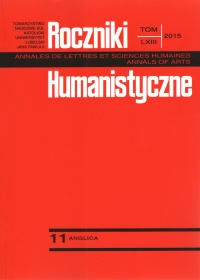On geographical and metaphorical (fault) lines: Immigration, acculturation and generation gap in South Asian American women’s fiction
Abstract
In numerous immigrant narratives by South Asian American women writers, the process of immigration is construed as the crossing of a line, or of several lines, to be more specific. The act of crossing the geographical line of the border precedes the crossing of more metaphorical boundaries, for example those between the two cultural scenarios operative in the writers’ native and adopted cultures. In the process, yet another metaphorical line is drawn between first- and second-generation immigrants, two groups that inevitably experience immigration in two completely divergent ways. The purpose of this article is to discuss several literary texts based on the construction of a literal or metaphorical line written by first- and second-generation South Asian American women writers (namely, Meena Alexander, Bharati Mukherjee, Chitra Banerjee Divakaruni and Jhumpa Lahiri) to map the different standpoints from which first- and second-generation writers explore the issue of migration. This analysis will be situated in the context of what Meena Alexander, a first-generation South Asian American poet and novelist, terms “fault lines” when she writes in her memoir: “In Manhattan, I am a fissured thing, a body crossed by fault lines” (Fault Lines 182). The concept of the geological fault line serves as a powerful metaphor for the fractures and discontinuities inherent in the process of immigration that will be discussed in this article.
References
Alexander, Meena. Fault Lines. New York: The Feminist Press, 1993.
Alexander, Meena. Manhattan Music. San Francisco: Mercury House, 1997.
Anzaldúa, Gloria. “La conciencia de la mestiza: Towards a New Consciousness.” Writing on the Body: Female Embodiment and Feminist Theory. Eds. Katie Conboy, et al. New York: Columbia University Press, 1997. 233–247.
Divakaruni, Chitra Banerjee. Arranged Marriage. New York: Anchor Books, 1995.
Divakaruni, Chitra Banerjee. The Unknown Errors of Our Lives. New York: Anchor Books, 2001.
Friedman, Susan Stanford. Mappings: Feminism and the Cultural Geographies of Encounter. Princeton: Princeton University Press, 1998.
Glenn, Evelyn Nakano. “Family.” Keywords for Asian American Studies. Eds. Cathy J. Schlund-Vials, Linda Trinh Vo, and K. Scott Wong. New York: New York University Press, 2015. 87–92.
Grewal, Inderpal. Transnational America: Feminisms, Diasporas, Neoliberalisms. Durham: Duke University Press, 2005.
Grice, Helena. Negotiating Identities: An Introduction to Asian American Women’s Writing. Manchester: Manchester University Press, 2002.
Kimak, Izabella. Bicultural Bodies: A Study of South Asian American Women’s Literature. Frankfurt am Main: Peter Lang, 2013.
Kimak, Izabella. “‘A Bridge That Seizes Crossing’: Art, Violence and Ethnic Identity in Meena Alexander’s Manhattan Music.” Polish Journal for American Studies 8 (2014): 149-166.
Lau, Lisa. “Re-Orientalism: The Perpetration and Development of Orientalism by Orientals.” Modern Asian Studies 43.2 (2009): 571–590.
Lee, Shelley Sang-Hee. “Immigration.” Keywords for Asian American Studies. Eds. Cathy J. Schlund-Vials, Linda Trinh Vo, and K. Scott Wong. New York: New York University Press, 2015. 128–133.
Louie, Andrea. “Generation.” Keywords for Asian American Studies. Eds. Cathy J. Schlund-Vials, Linda Trinh Vo, and K. Scott Wong. New York: New York University Press, 2015. 110-114.
Mukherjee, Bharati. Jasmine. New York: Fawcett Crest, 1989.
Song, Min Hyoung. “Asian American Literature within and beyond the Immigrant Narrative.” The Cambridge Companion to Asian American Literature. Eds. Crystal Parikh and Daniel Y. Kim. New York: Cambridge University Press, 2015. 3–15.
Srikanth, Rajini. The World Next Door: South Asian American Literature and the Idea of America. Philadelphia: Temple University Press, 2004.
Copyright (c) 2015 Roczniki Humanistyczne

This work is licensed under a Creative Commons Attribution-NonCommercial-NoDerivatives 4.0 International License.





